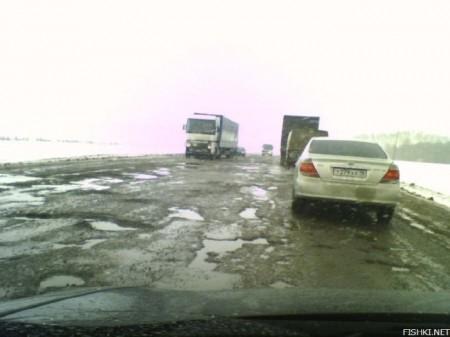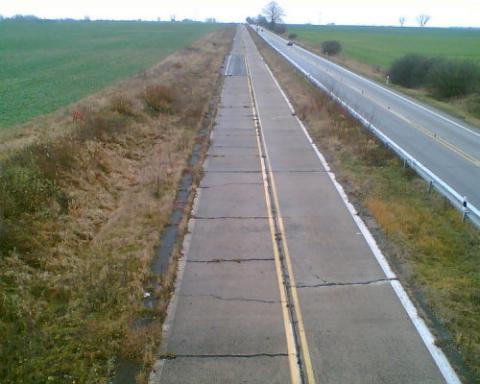
Hazards of a Russian highway in winter-spring
Paul Goble reports:
October 10 – The state of Russia’s road system, which now ranks 136 out of 144 countries evaluated, is so bad that even Vladimir Putin, who recently has been given to upbeat statements about the country, has had to change his tone.
At a meeting of the presidium of the State Council in Novosibirsk yesterday (the day after his birthday break), Putin changed his approach and spoke about the real problems of what he said was “a vitally important” sector of the Russian economy, one that other participants painted in even darker colors than he.
Rustam Minnikhanov, the president of Tatarstan and head of the State Council working group on roads, told the Novosibirsk meeting that 53 percent of federal highways and 63 percent of regional ones are substandard and that the situation is growing worse: Every year, the number of cars in Russia rises by six percent, but the highway system expands only 2200 kilometers.
In his speech, Putin said that the road sector remained “a difficult and problematic issue,” with any resolution of current problems being a matter for the future. He suggested that the quality of existing roads had not improved despite massive spending and that the size of the [road] network is insufficient to support economic growth.
The Kremlin leader blamed this on corruption, the lack of oversight, and the failure to update standards set 30 years ago. As a result, he said, “from year to year are rebuilt one and the same set of roads,” with no improvement in their quality or any opportunity to increase the size of the network.
Putin also expressed concern about the growth in prices for construction materials, a development that he said there was no justification for and that almost certainly reflected corruption in this branch. And he said officials needed to address the problem created when heavy trucks use roads intended primarily for automobiles.
“This is not a simple question,” the Russian president said, “but it must be resolved.”
Despite Putin’s comments, Ivakhnik says, the Novosibirsk discussion highlighted why nothing much can be expected anytime soon. Minnikhanov pointed out that the regions which are responsible for construction and repair of roads have lost the funds that they were supposed to get for this and Moscow’s plans to transfer more money to them won’t make up for that.
But of greater concern, the Russian commentator said, was another aspect of the Novosibirsk meeting: While Putin talked bluntly about the problems of the road sector, he “avoided making any categorical demands of the government,” and that suggests that nothing is likely to change for the better anytime soon.

When Germany was reunified in 1989, the Autobahns of East Germany were in virtually the same condition as they were in 1945, exhibiting the aforementioned qualities as well as inadequate signing, infrequent and often non-functional emergency phones located in the center median, and service areas consisting of a dilapidated roadhouse next to a wayside.
- 1097 views




